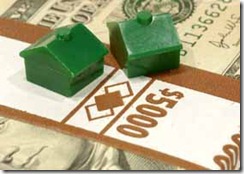So you want to be a landlord?
So you want to be a landlord? You’re not alone.
The temptation for would-be investors is strong: Thanks to record numbers of foreclosures, short sales, bank-owned properties and homeowners in distress, prices on all shades of real estate are low and getting lower. And what could be better than earning money each month while someone else pays for your property?
You may think now is the good time to snag an investment property or two and rent them out, and you may be right! But with all investments, there is some risk involved. Avoiding these newbie mistakes will improve your chances of success…
risk involved. Avoiding these newbie mistakes will improve your chances of success…
Over-Leveraging your Rental Properties
Borrowing as much money as you can when refinancing or buying rental properties may seem like a great idea. However, the problem is, you will then leverage yourself out of any monthly cash flow. This means you will be in the red as soon as you have a vacancy, or unexpected property maintenance. At the end of the year, you should show a profit if you keep your predictable monthly expenses (mortgage, taxes, and insurance) at no more than 50% of your month rent.
Ignoring Tenant Concerns
The roof is leaking, the washer is not working, and there are ants in the apartment… easy to procrastinate but harder to ignore long term. Addressing tenant concerns and potential problems with your rental properties quickly and effectively, will save you financially and may prevent any possible law suits. Send a handyman you trust out to the property to take a look, and more often than not, the tenant was merely overreacting… but you still have to check.
Failing to Properly Screen Tenants
When it comes to locating tenants, there can be a lot of bad apples out there. Remember to verify employment, obtain current and past rental history and provide a thorough background/credit check. An undesirable tenant will often have a poor rental and financial histories. It is probable that if they have not met their obligations with previous landlords, then chances are that they will repeat their behavior with you.
Using a Generic Rental Agreement
Using a generic rental agreement from the local office supply store is really a disaster waiting to happen. Why you may ask? Because each state has specific language that must be included within the lease and many states have special disclosures that must be attached to the lease. Additionally, states place limits on how much a landlord may charge for security deposits, how many days late the rent must be before a late fee can be charged and so on. Have your lease prepared or reviewed by your real estate attorney.
Failing to Serve Notice of Eviction
Falling behind on rent is not an option. You should treat your rental property as a business. Serve the tenants quickly when their rent is not paid, and it will send a strong message. The eviction can be cancelled when the tenant pays the rent.
Follow these tips and you’ll find that your rental business runs more smoothly.
Leave your questions or comments below and…
As always, thanks for reading BillOnBusiness.net!



I don’t want to be a landlord, but somehow ended up as one (deals I couldn’t pass up).
The last one is a biggie for new landlords! People want to help the tenants, and unfortunately, it usually makes matters worse.
The biggest mistake I’ve seen is when investors start talking about how many “units” they have rather than how much cashflow they have. Domino effect can come into effect very easily.
I think the most important part of the whole being a landlord plan is to have a solid exit strategy, particularly one to deal with non paying tenants. A good management company is also needed to scale up the operations.
Good info. Those are things to consider when you want to be a landlord.
Keep it coming.
I agree with Danny Johnson. No matter how many units you have if the cash flow is very low, then it’s profitable. It will be a shame calling you a landLORD if you can’t make a good profit out of your lands. LOL
Some really good tips especially about finding good tenants and keeping up with any issues. I have a few rental properties some with great tenants who look out for you and some not so great that I leased because I needed to fill the unit quickly. I am figuring out it even though it is harder to screen and get a good tenant I sleep easier at the beginning of each month not worrying about if the rent check is in the mailbox with my better tenants
Great write-up, Bill!
I especially like the first one on the list – being over-leveraged can definitely get out of control. Like anything, I think it’s really important for investors to know their customers (i.e. tenants) as in any business and really know what types of neighborhoods and clientele they’d prefer to work with. Not knowing this could be a recipe for disaster in the long run. Good tips! 🙂
Great article bill. Thank you. I know you are a huge fan of Lease/Option deals. Does option consideration influence your tenant screening in any way?
Hi Grant- It really doesn’t. Of course, the tenant (buyer) must have the funds available for the option fee, but the screening process is the same. I lean heavily on current employment and criminal background check. Not so much on the credit side, since I expect them to have dings on the credit report. I do have a VERY firm rule about no evictions.
Excellent insight! Thank you Bill.